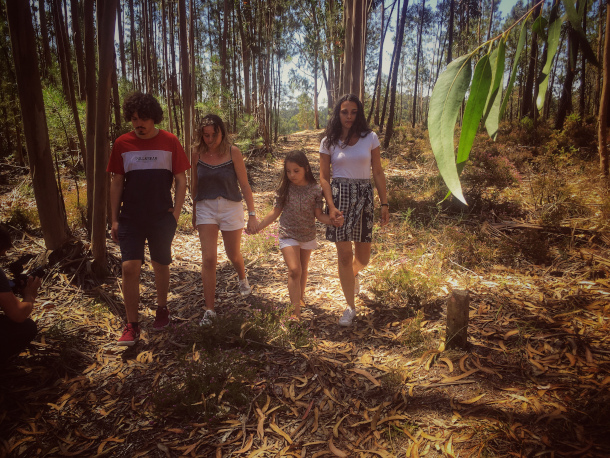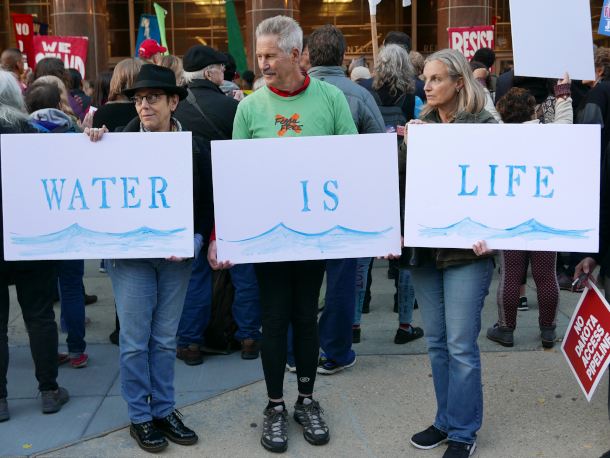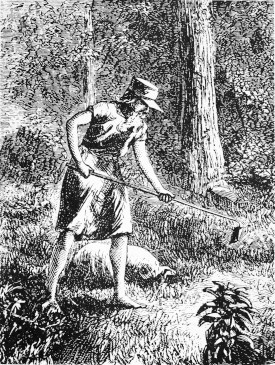Beyond the Headlines
Air Date: Week of September 22, 2023

Four of the six young people who will take European nations to court seeking climate action are from Leiria, a region of Portugal that experienced deadly wildfires in 2017. (Photo: Marcelo Engenheiro, Courtesy of the Global Legal Action Network)
This week, Living on Earth Contributor Peter Dykstra joins Host Steve Curwood to discuss a youth climate lawsuit against 32 European states, and the restoration of a Clean Water Act rule that was rolled back by the Trump administration. In history, they raise a glass of hard apple cider for Johnny Appleseed’s birthday.
Transcript
CURWOOD: On the line now from Atlanta, Georgia is Peter Dykstra, Living on Earth contributor who helps us look beyond the headlines. How're you doing, Peter? What's going on?
DYKSTRA: I'm doing well, Steve, I hope you are too. And we're looking at a court case in the European Court of Human Rights, where six young people from Portugal are suing 32 European nations over climate policies.
CURWOOD: Now, there're youth lawsuits all over the world. But these particular kids, what drove them to this filing?
DYKSTRA: The plaintiffs range in age from 11 to 24. But back in 2017, that's when the 11 year old was five years old, there was a tragic wildfire in Portugal that claimed 66 lives. And the claimants want these European nations to pick up their game, and at least cover their own contributions to climate change by better policies. Those nations range from the entire European Union, to non-EU members like the UK, and Russia.
CURWOOD: Now, what exactly are the nations of Europe saying in response to this suit?
DYKSTRA: Well, Greece, which has had its own share of catastrophic wildfires, basically said that there's no way to prove that climate change is linked to health problems like asthma or mental health problems, despite a battery of studies that have said that's exactly one of the biggest problems. These youthful plaintiffs are going to inherit all of this from us adults, and they want to make sure that their voice is heard, and the European Court of Human Rights will render a binding decision. So if they rule in favor of these six kids from Portugal, the 32 nations will have to act and clean up their act.
CURWOOD: Hey, Peter, what else do you have for us today?
DYKSTRA: The Biden administration is giving more power to states and tribes to block pipeline projects if those pipeline projects from energy companies are threatening water quality. The Clean Water Act is one of our strongest and most heavily challenged environmental laws. But in this case, the states can use it more easily to protect their own water supplies. States and tribes as well.

Protestors of the Dakota Access Pipeline hold signs that say ‘Water is Life’ in demonstrations against the pipeline’s construction. (Photo: Susan Melkisethian, Flickr, CC BY-NC-ND 2.0)
CURWOOD: I guess the Trump administration tried to limit the power of this part of the Clean Water Act after some pipelines were blocked citing this law. But Mr. Biden, I guess, is turning it around again.
DYKSTRA: He is. Same old story.
CURWOOD: And by the way, what do you have for us from the history vaults this week?
DYKSTRA: We're going to go way back to September 26, 1774. A momentous birth happened that day in Leominster, Massachusetts, ironically one of the places really slammed by rainfall and floods this past month. Back in that day, in the 18th century, John Chapman was born. He became better known as Johnny Appleseed. He was a roving preacher who went through Ohio and Indiana when they were still territories and when they constituted the western frontier of the United States. He planted apple orchards all over the place while preaching the gospel. And there's another reason that has very little to do with nutrition that Johnny Appleseed was so well received.
CURWOOD: And that would be?

Johnny Appleseed reached fame in part due to the popularity of hard cider made from the apple trees he had planted. (Photo: Harper’s New Monthly Magazine, Wikimedia Commons, Public Domain)
DYKSTRA: That would be the apple quality wasn't that good. You wouldn't want to eat them apples, but what it could be used for is making hard cider. So Johnny Appleseed preached the gospel and helped to get farmers and their families hammered throughout the western frontier of the US in its early days.
CURWOOD: That's right, because if you want the same kind of apple, you have to do a graft from the mother apple tree. And if you plant the seed, you get something random. But it does make good booze, it sounds like.
DYKSTRA: It does, apparently. Maybe we should do some research on that.
CURWOOD: Okay, Peter. Well, why don't you lift a glass and tell us what you find out?
DYKSTRA: I will. I'll get right on it.
CURWOOD: Alright. Peter Dykstra is a contributor to Living on Earth and we'll talk to you again real soon.
DYKSTRA: All right, Steve, always good to talk to you. And we'll do it again soon.
CURWOOD: And there's more on the stories on the Living on Earth webpage. That's LOE.org.
Links
The Guardian | “Young People to Take 32 European Countries to Court Over Climate Policies”
Smithsonian Magazine | “The Real Johnny Appleseed Brought Apples—and Booze—to the American Frontier”
Living on Earth wants to hear from you!
Living on Earth
62 Calef Highway, Suite 212
Lee, NH 03861
Telephone: 617-287-4121
E-mail: comments@loe.org
Newsletter [Click here]
Donate to Living on Earth!
Living on Earth is an independent media program and relies entirely on contributions from listeners and institutions supporting public service. Please donate now to preserve an independent environmental voice.
NewsletterLiving on Earth offers a weekly delivery of the show's rundown to your mailbox. Sign up for our newsletter today!
 Sailors For The Sea: Be the change you want to sea.
Sailors For The Sea: Be the change you want to sea.
 The Grantham Foundation for the Protection of the Environment: Committed to protecting and improving the health of the global environment.
The Grantham Foundation for the Protection of the Environment: Committed to protecting and improving the health of the global environment.
 Contribute to Living on Earth and receive, as our gift to you, an archival print of one of Mark Seth Lender's extraordinary wildlife photographs. Follow the link to see Mark's current collection of photographs.
Contribute to Living on Earth and receive, as our gift to you, an archival print of one of Mark Seth Lender's extraordinary wildlife photographs. Follow the link to see Mark's current collection of photographs.
 Buy a signed copy of Mark Seth Lender's book Smeagull the Seagull & support Living on Earth
Buy a signed copy of Mark Seth Lender's book Smeagull the Seagull & support Living on Earth

